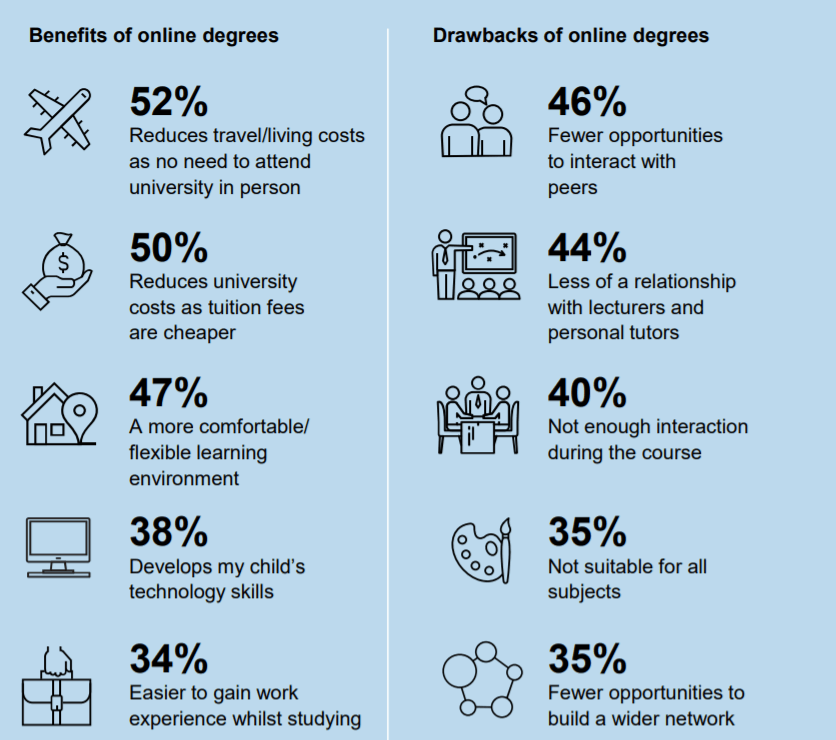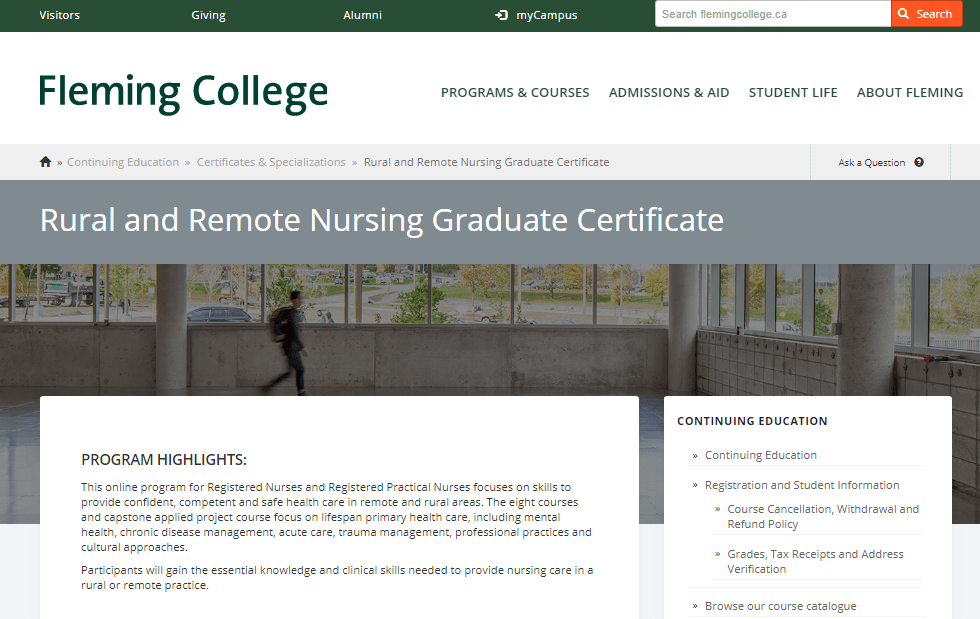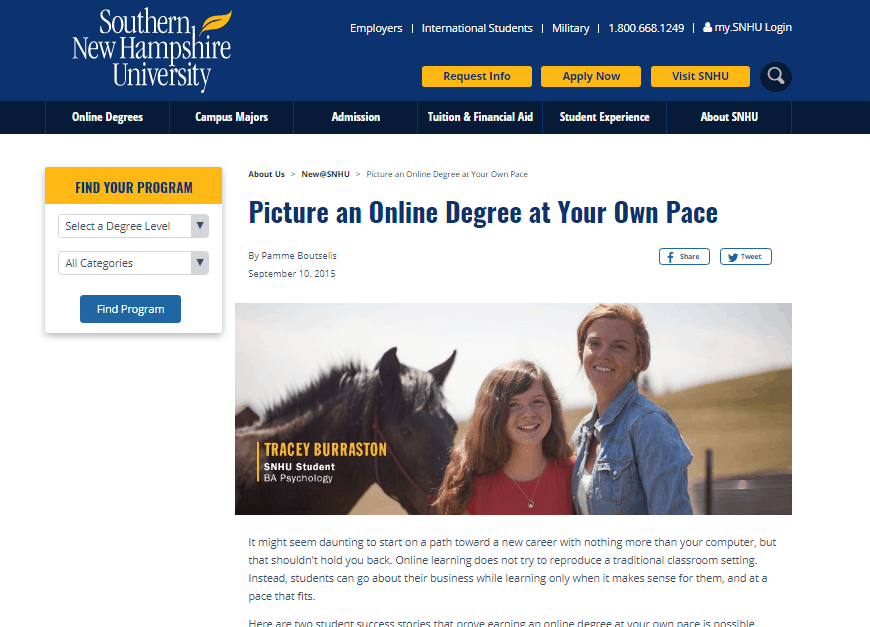
Once viewed as something of an inferior option to a traditional classroom experience, online learning continues to grow both in popularity and reputation. Advances in technology, together with more careful planning, has led to many institutions offering online courses that provide just as much depth and personalized instruction as their on-campus equivalents.
As a result, more and more students at all levels are beginning to consider online programs as an option for their needs, opening up a range of new and untapped markets for student recruitment. However, institutions seeking to promote online programs can still find the process challenging, as they grapple with a number of unfamiliar factors and variables.
If you are seeking to attract more interest for your online course offerings, or launching entirely new programs, read on to find out some specific tactics for recruiting online students.
Recent Trends in Online Learning
While in the past online learning has mostly been seen as the preserve of older, working students, recent years have seen its popularity grow among people of all age groups. To take the US market as an example, Digital Learning Compass’s Distance Education Enrollment Report 2017 put the number of students enrolled in distance education at as high as six million, while the most recent figures from the US Department of Education indicate that as many as 30 percent of students in undergraduate institutions take at least one course online.
The recent explosion of Massive Open Online Courses (MOOCs) has played a big role in online education gaining newfound traction and respect, with over 58 million students worldwide sampling online learning through sites like Coursera, Edx, and Udacity. While these courses are generally free and unaccredited, a number of steps have been taken recently towards monetizing them and implementing a recognized qualification system, and even potentially introducing full undergraduate degrees through MOOC sites.
Online learning is also becoming an increasingly popular option among international students, and their parents in particular. In Higher and Higher, a 2017 survey carried out by HSBC among the parents of international students in 15 countries, 60 percent of respondents said they would consider an online education as an alternative for their child. The number was even higher among parents in Indonesia, India, China, and Mexico; all countries with limited household incomes and somewhat traditional, family-oriented cultures.

The survey indicated that cost savings and a more comfortable learning environment were among the biggest draws of online learning, while some parents also valued the technological skills their child would gain, as well as the potential opportunities to gain work experience while studying. Nonetheless, respondents also voiced some concerns, such as the decreased opportunities for students to network and connect with their peers, as well as the limitations of the online delivery format.

Despite this, it is clear that online learning can present an invaluable option for students from developing countries with lower incomes, allowing them to access a higher standard of education without having to shoulder the financial burden of relocating to another country.
Developing Personas to Promote Online Courses
As it becomes more popular and accepted, schools of all kinds offering online learning can expect to attract prospective students from all walks of life. That, coupled with the global accessibility online courses offer, means that the potential audience for your courses is practically limitless.
Although this is undoubtedly a good thing, it can pose some problems for institutions. With such a world of choice available, how can you best focus your marketing efforts? While it might be tempting to cast as wide a net as possible, this can sometimes be a mistake, as it leads to promotional efforts that are unfocused and likely not to effectively reach seriously interested prospects.
For instance, many schools marketing online courses might assume that, given the diversity of online students, their programs will appeal to a much wider age range, when in reality they may be better off focusing more on mature students. Likewise, the global availability of their courses might lead them to mistakenly invest in numerous international markets which are unlikely to yield results. Or, they may believe that the flexible nature of their programs mean they will appeal to working professionals, when in reality the courses simply aren’t suited to their needs or lifestyle.
To ensure the best possible results, effective student persona development is perhaps even more crucial than normal. As a starting point, you should carefully consider what your course content has offer. What skills do students gain? Who might be interested in learning them online? And what are the advantages that taking this particular course online will offer over a classroom-based course? This will help you to narrow down your target audience significantly.
You should also consider the scope of the qualifications you offer. For instance, an online training course for healthcare professionals might be recognized and accredited by regulatory bodies in your country or region, but not elsewhere. This means that even if it offers useful skills and training for professionals around the world, it is unlikely to interest students from further afield, and keeping a local focus would be a much wiser decision.
Example: The Rural and Remote Nursing Graduate Certificate offered by Fleming College in Alberta is a good example of an online course which appeals to a very specific audience. Online learning can be an excellent way for professionals in rural areas to upgrade their skills without having to travel long distances.

Being realistic about the schedule you offer and the rigorousness of the course is also important. While many online courses offer some level of flexibility, not all allow students to work entirely at their own pace, and thus they may not suit busier individuals. In addition, more advanced courses which require high levels of independent study and work are still going to be problematic for full-time professionals, while international students may struggle to get to grips with more difficult programs that are not delivered in their native language.
You can get the information you need to craft detailed, realistic student personas for online courses through many of the same methodologies you would use for other programs. Surveying and reaching out to current students, asking your admissions staff what applicants tend to inquire about, and conducting an analysis of your competitors can all help to make your personas as accurate as possible and help you pinpoint the most suitable target audience.
Being realistic about the schedule you offer and the rigorousness of the course is also important. While many online courses offer some level of flexibility, not all allow students to work entirely at their own pace, and thus they may not suit busier individuals. In addition, more advanced courses which require high levels of independent study and work are still going to be problematic for full-time professionals, while international students may struggle to get to grips with more difficult programs that are not delivered in their native language.
You can get the information you need to craft detailed, realistic student personas for online courses through many of the same methodologies you would use for other programs. Surveying and reaching out to current students, asking your admissions staff what applicants tend to inquire about, and conducting an analysis of your competitors can all help to make your personas as accurate as possible and help you pinpoint the most suitable target audience.
Selling the Benefits of Online Learning to Prospective Students
When looking to promote an online program, it’s important to underline the specific benefits that studying in this format can afford. Chief among these is flexibility. An online course can enable students to fit their studies more easily around their work and home life, making it possible for those with pressing responsibilities to commit to obtaining a qualification.
A number of online programs are also keen to emphasize the opportunities this offers for students to begin (or continue) making headway in their career before they obtain their qualification, with the flexible study schedule making it easier to seek opportunities in their chosen field. Making this clear in your program pages and web content can be a great way to convince prospective students that this is the right option for them.
Example: Johnson & Wales University created this blog post which highlights the career benefits of opting for online study.

With many online courses, this also means that students are free to complete their studies at their own pace. For example, a working student who is looking to undertake professional development training, but doesn’t have the time to finish the course in a matter of weeks can complete their studies over the course of a few months, lessening their workload and making the experience altogether more pleasant, enjoyable, and less pressurized.
Example: This blog post from Southern New Hampshire University uses testimonials from students to emphasize the benefits of self-paced online study.

This notion of flexibility also extends to location. Because their study takes place entirely online, students can do it from anywhere in the world. Highlighting this in your digital marketing efforts can be especially effective when recruiting international students, who may be based in countries with less-developed education systems. Online learning enables them to get the education they want, from the institution they want, and at the standard they demand, all without having to relocate.
Example: UK-based language school Scotland Study Centre makes being able to study from anywhere in the world a key part of its messaging for its online courses.

With this flexibility also comes significant cost-savings. For many institutions, offering courses online can reduce the overheads created by needing to pay for class space and supervisory staff, making it possible to offer courses at reduced fees.
Even if the course fees themselves are the same, online learning can still offer significant cost-savings. For one thing, it eliminates the need for students to relocate and pay for short or long-term accommodation somewhere else. Being more easily able to work during their studies can also help to offset the cost of their education dramatically, reducing the need to take out large student loans and hinder their financial progress after they graduate.
Example: This blog from Independence University about the benefits of studying graphic design online makes saving money one of the key points.

While these benefits are common among almost all online courses, your own offerings may also offer some additional specific advantages. For instance, a technologically focused online course could better facilitate practical training than a classroom-based course. Or, a course with an international focus could use the online format to encourage a more diverse, multicultural student body, therefore ensuring a range of different perspectives from around the world. Once you begin to examine the benefits your course offers in a more focused way, its unique selling points will become clear.
Addressing Common Barriers to Entry for Online Students
As much as promoting these advantages is important when marketing online learning, it’s also equally important to address some of the most common barriers to entry for this type of course head-on.
One often overlooked area of concern for students is just what their day-to-day study experience will be. Many will have never studied online before, and be unsure of what to expect. Older students, in particular, may be especially concerned if they are not adept with technology, and be nervous about trying to get to grips with learning through an online platform.
The best way to allay this concern is to be as transparent as possible about your learning methodology. Try to explain what kind of learning platform you use, and even provide samples of lectures or online demos of it. This will help to reassure prospective students that the experience you offer will be simple and intuitive.
Example: Capella University provides free trials of its courses in order to allow prospective students to experience their online platforms before they commit to enrollment.

This point ties neatly into another area which online students are frequently unsure about: the level of academic support provided by your institution and its instructors. Frequently, potential applicants fear that they will be left entirely to their own devices in an online course, with no help from instructors to understand any course material they have trouble with.
While this may have been somewhat true about distance learning in the past, online instruction provides a number of useful avenues to facilitate communication. Course tutors can be easily contactable by email or online chat, hold webinars or group discussion forums to encourage engagement, or even arrange Skype sessions with students to review their work. Armed with these tools, an online instructor can be just as involved and hands-on with their students as they are in a classroom setting.
To ensure that students know their needs will be met in this area, try and make the support you offer as accessible as possible. Ensure that details of what you provide are easy to find on your website, and explain what students can expect in a clear and reassuring way. This will ensure that your students feel connected to your institution, and are more likely to come out of your course with a positive experience that they will share with others.
Example: Swinburne University in Australia provides prospective online students with comprehensive study support, which it details on a dedicated web page.

Students are also likely to have reservations about the amount of interaction they have with their classmates during their course, particularly as younger individuals begin to consider online learning as an option. For many, the social component of an education is extremely valuable, and foregoing it can leave them feeling as though they are missing out on a vital part of their experience, even if they are gaining other benefits.
However, for some institutions, it is possible to turn this perceived weakness into a strength. Many modern online courses encourage students to connect with another through group projects, discussion forums, and other channels, meaning they can meet just as many new people as they would in a classroom-based course. And because online students can come from a diverse range of backgrounds and locations, these connections are often even more personally and professionally enriching. If your course has these elements, promoting them can be a surefire way to convince skeptical prospective students that it will introduce them to like-minded individuals.
Example: Through student testimonials and videos, Sotheby’s Institute of Art highlights the value of studying online with a diverse group of peers from all over the world.

Perhaps the most important misconception your institution will have to address, however, is that of academic rigor. Because online learning is less well-established than traditional education, many students worry that their qualifications will be perceived as lesser than those who have obtained them in a physical environment. Reassuring them that their qualification will be treated with the respect it deserves is therefore paramount in your marketing efforts.
Example: The University of Liverpool takes care to emphasize that its online degrees are equal in stature to its classroom-based qualifications, while also highlighting its high rank and Russell Group membership to further reassure prospective students.

The university also displays information about its online faculty on its site, detailing their credentials, experience, and expertise. This can be another great way to reassure students that the standard of instruction in your online programs is high.

Another useful way to mitigate concerns about educational standards is to share success stories from previous graduates. If you can demonstrate that students who have completed a qualification online have gone on to experience success in their chosen field, it will show students that your program provides them with the skills and credentials they need to get where they want to go.
Example: This profile of an online Bachelor of Liberal Studies graduate from the University of Iowa demonstrates the value the qualification has brought to her career.

Choosing the Right Channels to Promote Online Courses
Schools interested in recruiting online students will usually find that they can take a similar approach to planning and structuring their campaigns as they would when promoting traditional courses.
Creating relevant website, blog, and social media content, and amplifying and sharing your marketing efforts across multiple digital channels will be crucial in helping you attract online students. You may find, however, that more traditional marketing channels like print, TV, and radio are less effective, as are physical events like open houses and recruitment fairs. Since students are planning to study online, that is likely to be the first place they look when researching their options. This is not necessarily true for all courses, though, and programs which target older or less tech-savvy students may still find some joy through traditional marketing channels.
Targeting specific keywords for SEO and paid advertising is also effective, although it may be helpful to focus on variations that incorporate phrases like ‘online course,’ ‘distance learning,’ or ‘blended learning,’ to ensure that you attract students who are specifically interested in studying in that format.
Example: The University of Colorado – Colorado Springs have targeted the keyword ‘study engineering online’ for an AdWords campaign. Because engineering degrees are not commonly offered online, selecting keyword variations like this is a good way to attract students who are specifically looking for an online course.

Overall, successfully promoting online courses comes down to effectively communicating their unique value proposition, while working hard to assuage common concerns and misconceptions. Do this well, and you may find that online programs help your school reach farther and wider than ever before.







